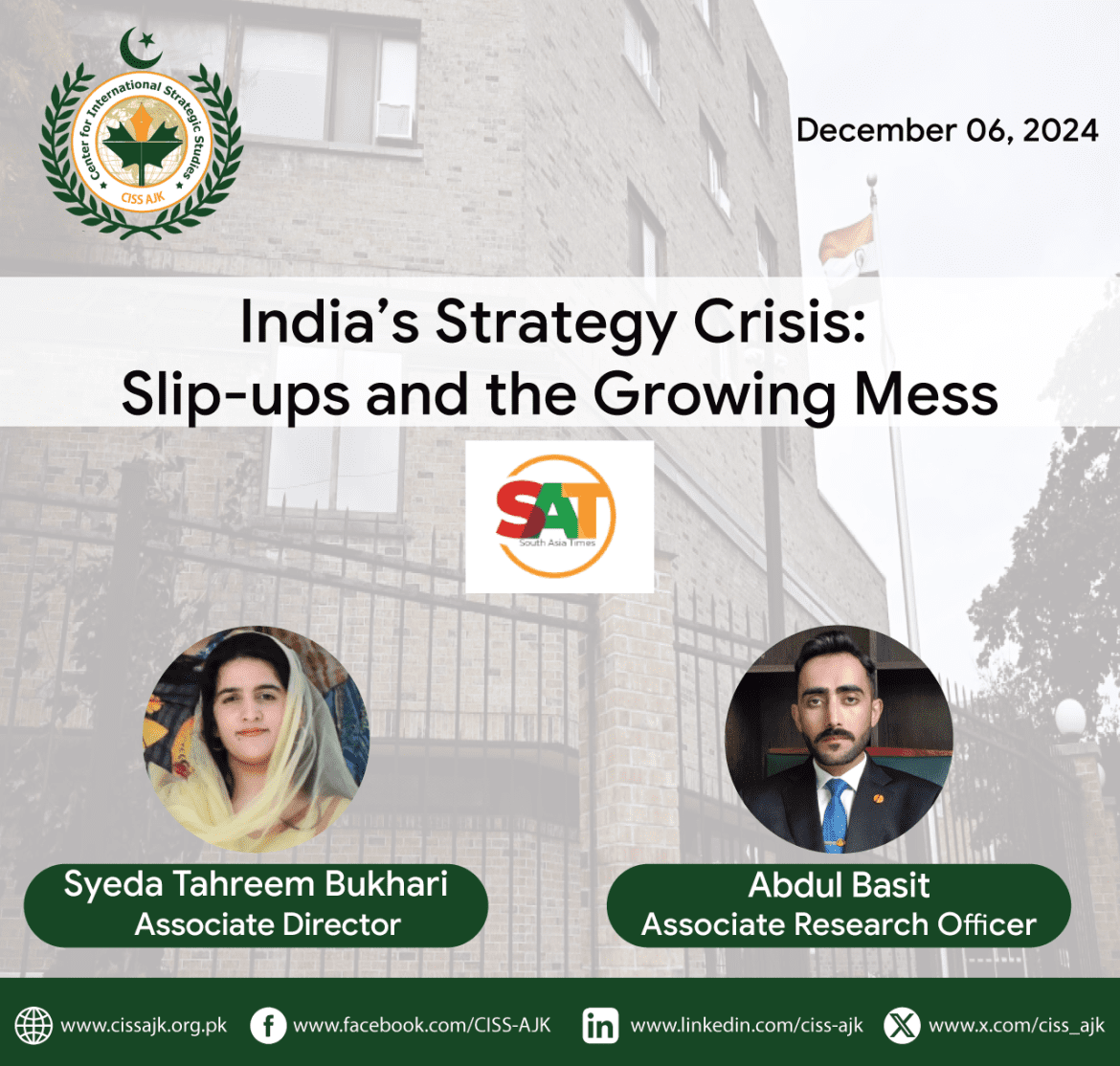India’s strategy crisis is unfolding like a tangled web, where bold ambitions clash with glaring missteps. Mounting accusations of transnational aggression are marring India’s rise as a global power. A growing diplomatic rift with key nations adds to the challenges. Controversy and crisis now overshadow the country’s once-celebrated trajectory.
India’s Strategy Crisis: Parliamentary Concerns and Diplomatic Spats
As reported by the Indian Express, Members of the Parliamentary Standing Committee on External Affairs on Wednesday, December 4, questioned the Indian government on the diplomatic spat with Canada over the killing of Khalistan separatist Hardeep Singh Nijjar. They specifically highlighted the difference in India’s responses to allegations leveled by Canadian and US agencies.
While India reacted sharply to Canada’s claims of its involvement in the Nijjar case, its response to the United States accusation of an Indian plot to assassinate separatist Gurpatwant Singh Pannun on American soil was notably muted.
MPs questioned Foreign Secretary Vikram Misri about the reasons behind this discrepancy. The issue became more complicated due to an ongoing high-level probe into the evidence provided by the US.
Canadian authorities recently informed consular officials at the Indian Consulate in Vancouver that audio and video surveillance had targeted them. They also reported that their private communications were intercepted. Minister of State for External Affairs Kirti Vardhan Singh confirmed this in the Rajya Sabha. The Indian government lodged a formal protest with the Canadian High Commission on November 2, 2024. It deemed these actions a blatant violation of diplomatic norms. Canada’s National Cyber Threat Assessment for 2025-2026 added fuel to the fire. The report categorized India as a “state adversary” under its cyber threat analysis. India described this move as baseless and reflective of Canada’s “negative approach” to bilateral relations.
Also See: High Stakes: Five Eyes, India-Canada Row and US Elections
Khalistan Separatism: A Flashpoint
Canada-India relations began deteriorating last year after an Indian transnational racket allegedly murdered Hardeep Singh Nijjar. Assailants shot Nijjar dead on June 18, 2023, while he was leaving the parking area of the Sikh Temple in Surrey, British Columbia. He was a local leader of the Khalistan movement, actively advocating for a distinct Sikh nation. India had declared him a terrorist in 2020.
Recently, the Canadian government revealed in a fresh course of investigations that Indian Home minister Amit Shah is behind the killings of the Sikh Activists. Shah is one of Modi’s closest advisors. He implemented some of the most divisive policies of the BJP government, such as canceling Jammu and Kashmir’s special autonomy status, a policy concerning an internationally recognized disputed territory. In 2010, authorities arrested Amit Shah in connection with extrajudicial executions. Later, India’s highest court dismissed the case due to a lack of evidence. People consider Shah the most influential person in India under BJP rule.
Furthermore, the investigations also revealed Amit Shah’s nexus with Lawrence Bishnoi to carry out transnational terrorism activities such as extortion, homicide, and other violent acts. It blurs the line between government duties and criminal activities raising alarms on how the underworld has reached the developed world with state-sponsorship.
Uneven Responses to International Allegations
India instead of collaborating with Canada on investigations denied the claims as “absurd,” deteriorating the diplomatic ties between the two. The expulsion of top ambassadors by Canada replicated by India has escalated a diplomatic spat that has plagued the two nations’ bilateral ties since 2023. Instead of collaborating with Ottawa, New Delhi alleges the Canadian PM’s act as an attempt to garner Sikh vote bank. Canada has frequently mentioned continued cooperation among the Five Eyes members, an intelligence sharing network among the US, the UK, Canada, New Zealand, and Australia.
Moreover, the indictments against New Delhi’s belligerent role are further strengthened by the charges placed down by the US. US authorities claimed to have foiled an assassination plot against its citizen and Khalistan movement activist Gurpatwant Singh Pannun. The plot was allegedly orchestrated by the Indian transnational terrorism racket. In contrast to Canada, the United States indicted Vikash Yadav. At the time, Yadav was working for India’s premier intelligence agency, Research and Analysis Wing (RAW). He was accused of conspiring to murder Pannun. According to some reports, Yadav, a former Central Reserve Police Force (CRPF) officer, ordered the attack on Pannun. He exchanged many texts with Nikhil Gupta, a co-conspirator currently detained in the United States.
India-Canada Rift
There was unperturbed silence from Five Eyes over Canada allegations last year, though this time the US and the UK showed concerns over Indian government involvement in transnational aggression and demanded cooperation from India with Canada regarding investigations in this regard. However, India refuted Canada’s allegations and maintained no evidence provided to them by Canada to support its claim. The same accusations that Delhi has frequently made about Pakistan are now used against Canada. It charges Ottawa with providing sanctuary and financial support to terrorists who oppose India. However, the language used to make these accusations against Canada has recently been more forceful than that used against Pakistan.
New Delhi has been enjoying a favorable external environment. The Canadian accusations against India run counter to this. New Delhi is being courted to help counterbalance Beijing. The widening divide between India and Canada will have implications for the growing strategic understanding between the U.S. and Western democracies.
Global Implications of India’s Strategy Crisis
India has been steering the international current in a manner that does not undermine its interests, as it was seen when Western countries raised concerns about India’s “neutral” position on Russia’s war with Ukraine.
India’s neutral stance itself is challenged by its growing trade relations with Russia in the defense domain. Despite a ban imposed by the Western nations on export of technology with Russia, India becomes the second largest supplier of restricted technology to Russia. The US has to articulate its strategy concerning India, by brushing the later strategic blunders under the carpet would not benefit US interests in long run.
Furthermore, India is attempting to normalize its relations with China as well. It has announced an agreement with China before the BRICS Summit to resolve the border dispute. The US does not have any guarantee from India that it will act countermeasures to China. The US might be beginning to realize this as well. It has recently placed two Indian nationals and 19 Indian private companies on a list of “nearly 400 entities and individuals” from several nations that will be subject to penalties for allegedly supporting Russia’s war activities in Ukraine. The US stated that it would not be entirely satisfied until investigations from India into the alleged foiled plot produced “meaningful accountability”.
The Way Forward
India’s strategy crisis is turning into a growing liability. This is not only for its own global standing but also for its partners in the West. By ignoring mounting evidence of government-underworld links, the U.S. and its allies risk enabling harmful behaviors. These actions could undermine international stability.
The West also has to chalk out a preventive approach to ban the nexus of government with the underworld for their stakes threatening the territorial integrity and sovereignty of other states.
In its pursuit of global influence, India finds itself ensnared in a strategy crisis where ambition outpaces ethics and missteps cloud potential. The path forward demands clarity, collaboration, and a commitment to the principles of diplomacy, lest the tangled web tighten further around its own aspirations.
The views expressed in this article are the author’s own. They do not necessarily reflect the editorial policy of the South Asia Times.
Syeda Tahreem Bukhari is a Research Officer at the Centre for International Strategic Studies-AJK. She holds an MPhil in Peace and Conflict Studies from National Defence University, Islamabad, and is an alumni of NESA. She also serves as an Ambassador for the Institute for Economics and Peace (IEP).
Abdul Basit is Associate Research Officer the Center for International Strategic Studies-AJK. He holds Bachelors in International Relations from National Defence University, Islamabad, and is an alumnus of NESA.





